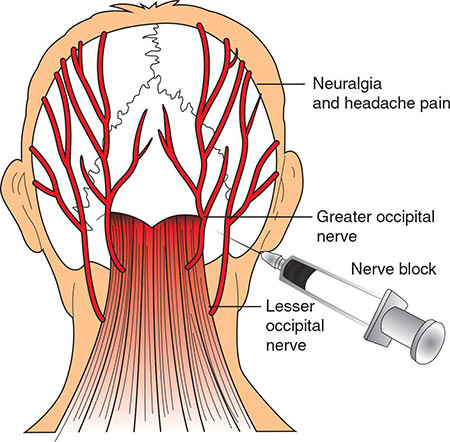 Midtown Manhattan
36 W 44th St Ste 1416 New York, NY 10036
Midtown Manhattan
36 W 44th St Ste 1416 New York, NY 10036
- (212) 621-7746
- text us
- BOOK ONLINE Call for Same Day Appointments
 Midtown Manhattan
36 W 44th St Ste 1416 New York, NY 10036
Midtown Manhattan
36 W 44th St Ste 1416 New York, NY 10036
Headaches and stabbing neck pain, diagnosed as occipital neuralgia, can be treated with an occipital neuralgia nerve block. Occipital nerve blocks are medicated injections that prevent the nerves from transmitting pain signals to your brain. The occipital nerve block procedure can be done in your pain management office by the best occipital nerve block specialist in New York. The chance of an occipital nerve block migraine or any other side effect is very low.
 Your occipital nerves run through the muscles at the back of your head, just above your neck. There are two occipital nerves, one on either side of your head. When healthy, they carry physical sensations from the top and rear of your head to your brain.
Your occipital nerves run through the muscles at the back of your head, just above your neck. There are two occipital nerves, one on either side of your head. When healthy, they carry physical sensations from the top and rear of your head to your brain.
A jarring neck injury to this part of your head, like the kind you can get from playing football or rugby, can damage one or both occipital nerves, causing neck pain and headaches. You may also suffer from this type of pain, also referred to as occipital neuralgia, if your occipital nerves are inflamed or irritated. If this describes the pain you’re suffering from, you’re a good candidate for an occipital neuralgia nerve block at our pain treatment clinic.
The pain from a pinched or damaged occipital nerve appears on just one side of your head, unless both nerves were affected. You may feel a sharp and stabbing pain that can radiate toward your eye. It can make your forehead so sensitive that you can’t wash your hair, wear a hat or rest your head on a pillow. Occipital nerve pain makes it difficult to maintain your lifestyle.
Occipital nerve blocks are designed to relieve you of the pain from one or both occipital nerves. A nerve block injection interferes with the nerve’s capability to send pain signals to your brain. You may need more than one treatment for it to reduce your pain, but occipital nerve blocks can remain effective for several months.
To perform an occipital neuralgia nerve block, our sports injury doctor follows a simple procedure. It’s relatively painless and takes just minutes to complete. The steps, similar to a cervical epidural steroid injection, include:
My pain has significantly reduced since I started seeing Dr. Melepura for occipital nerve blocks, which is something I never expected to happen. I no longer stress over being unable to run around and play with my kids. I'm so happy beyond words!
Kate DanielThe anesthetic in the injection kills your pain immediately, but that’s just a temporary fix, and the anesthetic wears off after a few hours. So, you can expect your pain to return. You may even experience an occipital nerve block migraine headache, as your head is sore from the injection process and from the medication itself. Remember, this pain is also temporary.
You shouldn’t have an occipital neuralgia nerve block if you’re on blood-thinning drugs, have an untreated heart condition or suffer from diabetes. Also tell your doctor if you have an active infection in another part of your body. You may have to reschedule your occipital nerve block procedure.
Complications and Side Effects From Occipital Nerve Blocks are rare. But a small percentage of patients may experience:
Contact our best-rated pain specialist in NY right away if you experience worsening pain or the symptoms of a fever. Remember that the pain-killing effects of the steroid medication don’t start to work until two or three days after your occipital nerve block procedure. Don’t exert yourself while you’re waiting for the medicine to do its job. Once the pain has eased, you can return to your normal routine.
Do you have any questions about the occipital nerve block we offer for neck pain in NYC? Would you like to schedule an appointment with the best-rated pain doctor Febin Melepura MD at a sports pain clinic in NYC? Please contact our office for a consultation with the top pain relief specialist in Midtown Manhattan.
Sports Injury & Pain Management Clinic of New York
Febin Melepura, MD is a top rated, best in class interventional pain management doctor. He is a nationally recognized pain relief specialist and is among the top pain care doctors in New York City and the country. He is an award winning expert and contributor to a prominent media outlets.
Dr. Febin Melepura has been recognized for his thoughtful, thorough, modern approach to treating chronic pain and, among other accolades, has been named a “top pain management doctor in New York”, and one of “America’s Top Doctors™” for an advanced sports injury treatments.